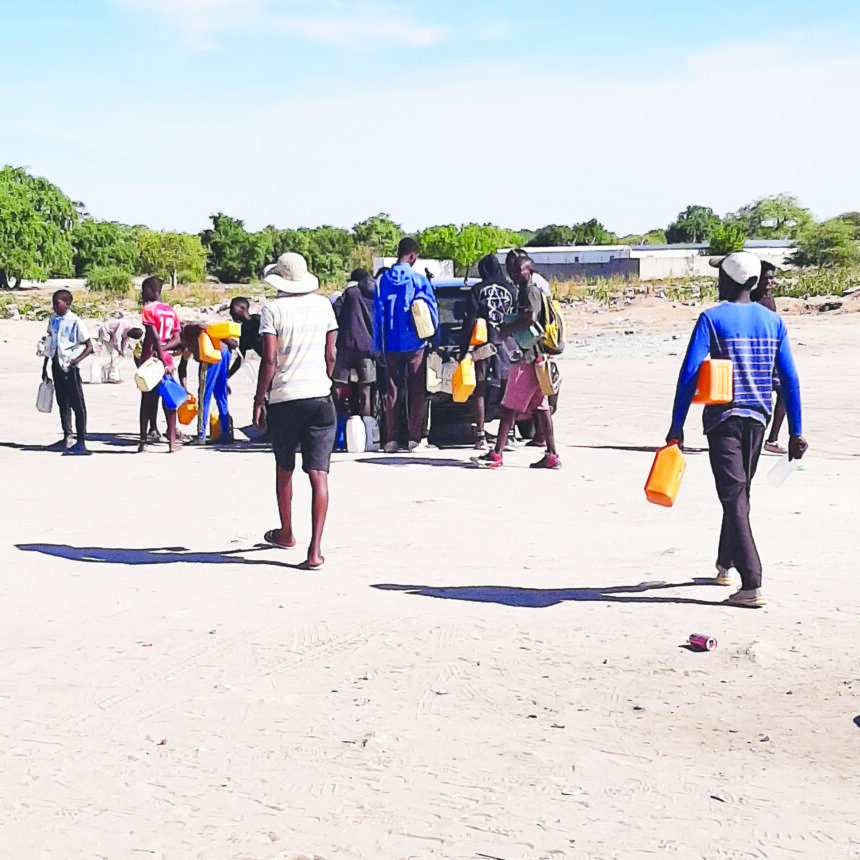…as northern homes turn into service stations
ONGWEDIVA – Learners from the surrounding villages at Oshikango are reportedly dropping out of school and skipping lessons, turning to Ngungula, the booming fuel smuggling business.
The aim is to generate income and sustain their families’ livelihoods.
Ngungula is derived from the word ‘okungungula’, which is an Oshiwambo term for trotting or running steadily.
This is in reference to the actual activity that takes place during the fuel transaction between Angolans and their Namibian customers.
Sellers emerge trotting from specific points in the bush with their containers of fuel when they spot potential customers.
Their daily customers include Namibian taxi drivers and certain individuals who buy from them to resell for profit within Oshikango or beyond. The Ohangwena police spokesperson Andreas Nghiyolwa said the matter was brought to the police’s attention by parents after noting their absenteeism from school.
Some parents have since approached the police for intervention.
“The police are always committed to preventing the smuggling of illegal fuel,” he said. A mother who spoke to New Era yesterday blamed the situation on peer pressure.
Her son, who deals with illegal fuel, is in grade nine. “I tried many times talking to my son. However, he told me that he wants to make money the same way as the Angolans who are smuggling fuel,” she added.
When this publication visited Oshikango last week, Angolan nationals who spoke on condition of anonymity said police officers have become their friends.
“We get used to the police officers. We are like brothers. This motivates us to continue trading fuel illegally,” a ngungula supplier boasted. Despite the efforts put in place by the police daily, the operation of illegal fuel is continuing at Oshikango. It appears to be a losing battle, as business continues uninterrupted.
Home stations
It is alleged that some homesteads surrounding Oshikango and houses in
towns such as Oshakati, Eenhana, and Ondangwa have turned into full-blown service stations, while legitimate service stations have been forced to close shop.
So far, three Puma service stations in the Ohangwena region have stopped operations due to competition brought by the rapid growth in cross-border fuel smuggling.
Moreover, service stations at Omafo, Oshikango and Ondobe have ceased operations as Ngungula has pushed them out of business.
The price of smuggled fuel has also decreased sharply, as there are many individuals operating the same business at Oshikango.
Cheap
Currently, a five-litre container of petrol or diesel is sold at N$50, while the 25-litre container goes for as little as N$250.
Previously, the five-litre container of petrol or diesel was sold for N$80, while the 25-litre container went for as little as N$300.
Those who buy for profit then resell the 25-litre container at N$250 to N$430, making N$150 to N$180 profit. This amount of fuel costs about N$530 at local service stations.
Last week, the Ministry of Mines and Energy kept petrol and diesel prices unchanged for August.
This decision resulted in petrol prices at Walvis Bay remaining at N$22.20 per litre, diesel 50ppm price to remain at N$21.57 per litre, and diesel 10ppm price to remain at N$21.67 per litre. Contacted for comment, Ohangwena education director Isak
Hamatwi called on parents to join hands with the police, saying it is the only way to keep learners in schools. “Learners need to be in school. The business of smuggling fuel isn’t permanent, but education is very important,” he said.
He also urged teachers to inform the parents whenever they notice certain learners missing classes.
“Let’s work together to keep a Namibian child in school. Together, we can make it possible to prevent our learners from being involved in illegal business activities,” Hamatwi said.
The seasoned educator then applauded parents for bringing the matter to the police’s attention.
Naloba’s cry
Last week, the Namibia Local Business Association (Naloba) met President Nangolo Mbumba at State House to express concerns over pertinent issues threatening their business. Standing head and shoulders above the rest was the free flow of Ngungula into Namibia. –fhamalwa@nepc.com.na



